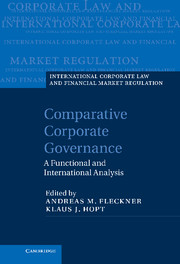Book contents
- Frontmatter
- Contents
- Contributors
- Preface
- Abbreviations
- Part I General report
- Part II National reports
- A Australia and Asia
- B Europe
- 6 Austria
- 7 Belgium
- 8 Denmark
- 9 Finland
- 10 France
- 11 Georgia
- 12 Germany
- 13 Hungary
- 14 Luxembourg
- 15 Netherlands
- 16 Norway
- 17 Poland
- 18 Portugal
- 19 Spain
- 20 Switzerland
- 21 United Kingdom
- C The Americas
- Part III Annex: Questionnaire
- Index
- References
12 - Germany
Internal and external corporate governance
from B - Europe
Published online by Cambridge University Press: 05 July 2013
- Frontmatter
- Contents
- Contributors
- Preface
- Abbreviations
- Part I General report
- Part II National reports
- A Australia and Asia
- B Europe
- 6 Austria
- 7 Belgium
- 8 Denmark
- 9 Finland
- 10 France
- 11 Georgia
- 12 Germany
- 13 Hungary
- 14 Luxembourg
- 15 Netherlands
- 16 Norway
- 17 Poland
- 18 Portugal
- 19 Spain
- 20 Switzerland
- 21 United Kingdom
- C The Americas
- Part III Annex: Questionnaire
- Index
- References
Summary
General information on corporate governance
As such, the concept of “corporate governance” as a generic catchphrase for all legal issues relating to the internal decision-making processes within corporations, as well as the legal and institutional mechanisms available for the control of management, carries no technical legal meaning within German corporate law. Traditional legal doctrine tends to differentiate between the organizational and financial constitution of corporations (Organisationsverfassung, Finanzverfassung) instead, thus emphasizing a rather static concept of constitutional provisions rather than the dynamic nature of the processes that take place within the legal and institutional framework established mostly by mandatory provisions in the applicable corporate law statutes. The term was not introduced into the German academic debate until the 1990s, primarily as a consequence of an increasing body of comparative studies of Anglo-American and German corporate law and reflecting a strong tendency toward the reception of foreign – notably US – legal concepts that have superseded traditional German concepts in a number of different aspects, as well as the growing influence of European legislation on specific fields of corporate law and corporate governance.
For some time now, the concept has also been formally recognized in statutory law, but only to the extent that listed stock corporations have been required by law since 2002 to issue and publish an annual statement of compliance with the recommendations of the German Corporate Governance Kodex (“the Corporate Governance Code”), and to disclose any deviations in this regard. The Corporate Governance Code has been promulgated by a government-appointed commission of market practitioners and academic corporate governance experts (the Regierungskommission Corporate Governance).
- Type
- Chapter
- Information
- Comparative Corporate GovernanceA Functional and International Analysis, pp. 521 - 571Publisher: Cambridge University PressPrint publication year: 2013
References
- 3
- Cited by

